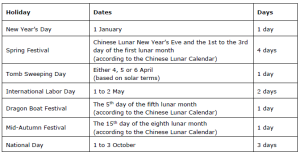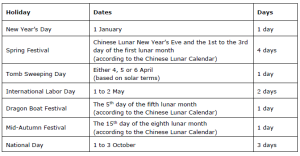On November 10, 2024, the PRC State Council amended the Measures for National Public Holidays and Memorial Days (Measures), which will take effect on January 1, 2025. Starting from 2025, the public holidays in China will be increased by two days. As a result, the annual public holidays will reach 13 days per year.
According to the newly amended Measures, the Chinese Lunar New Year’s Eve will be a public holiday, and one more public holiday will be added to the International Labour Day on May 2. Based on such changes, the Chinese public holidays will be as follows:
Arrangement to take a public holiday
As a traditional practice, to provide longer, uninterrupted holidays for travelling and family visits, the Chinese government usually made a comprehensive arrangement by adjusting the working days and rest days before and after public holidays. For example, a 3-day’ National Day holiday will be extended to seven days with adjustments.
In 2025, such practice will continue, but different from what happened in the past, when arranging for public holidays, the Chinese government will ensure that the adjusted consecutive working days around the public holidays shall generally not exceed 6 days. Further, if a one-day public holiday falls on a Wednesday, no adjustment on working days or rest days will be made.
For 2025, the Chinese government already announced the adjustment of working days or rest days for public holidays on 12 November 2024. Therefore, companies may arrange their employees’ work based on adjusted working days and rest days in advance. Legally speaking, such adjustment made by the Chinese government is not mandatory and companies may decide whether to follow such adjustment or not at their discretion. However, if a company does not follow the adjustment, the company might encounter inconvenience because governmental authorities and most companies will not work on the working days which have been adjusted to rest days.
Impacts on working hours of employees
With the increase of public holidays from 11 to 13 days, the annual working days of an employee will be changed accordingly from 250 days to 248 days. This will bring a slight change to the standard working hours of employees and accordingly the HR management in daily work.
- The monthly working days for calculating the standard working hours of employees will be changed from the original 20.83 days to 20.67 days. Along with such change, the standard working hours of employees who work under a comprehensively calculated working time system will be reduced. For example, for an employee whose working hours are comprehensively calculated every quarter, the total quarterly working hours of such an employee will be reduced from 500 hours to 496 hours. For an employee whose working hours are comprehensively calculated yearly, the total annual working hours will be reduced from 2,000 hours to 1,984 hours. According to PRC law, the working hours of employees exceeding standard working hours as calculated under a calculation period such as one quarter or one year should be subject to overtime payments at the rate of 150% of employees’ daily salaries. This means that with the increase in public holidays, companies may need to pay more overtime payments to employees than in the past for the same working hours under the comprehensively calculated working time system.
- Further, with the increase of two days of public holidays, if companies arrange for the employees to work on such two days, i.e. the Chinese Lunar New Year’s Eve or May 2, according to the law, companies must pay them overtime payments at the rate of 300% of the employees’ daily salary except if the employees are subject to the flexible working time system and are based in locations other than Shanghai, Shenzhen, Xiamen and Hunan Province, etc.
Nevertheless, the increase of two days of public holidays does not impact the working days for payroll calculation. This is because, under PRC law, companies are obliged to pay full salaries to employees for public holidays. As a result, the monthly payroll days will remain at 21.75 days without change. Please note that the monthly payroll days are used to calculate the daily salary of employees which will be applicable for the calculation of sick leave salary, compensation for unused annual leave, etc. This means that companies will not need to pay more to an employee for sick leave or untaken annual leave due to the increase in public holidays.
Take Away
In principle, in case of issuance of any new laws or regulations which conflict with company policies, the new laws and regulations will prevail. Therefore, companies do not necessarily need to update their employee handbooks and HR policies just to reflect the change in public holidays.
Further, the increase of two days’ public holidays will not bring a lot of changes to daily HR management work except for companies adopting the comprehensively calculated working time system. They need to calculate overtime working hours of employees based on the new standard working hours.
Moreover, companies may wish to continuously pay attention to the announcement of the Chinese government on the arrangement of taking public holidays every year so that they can manage the holidays and work of employees properly. – CMS China
The post HR changes with two new public holidays in China appeared first on HR ASIA.



















